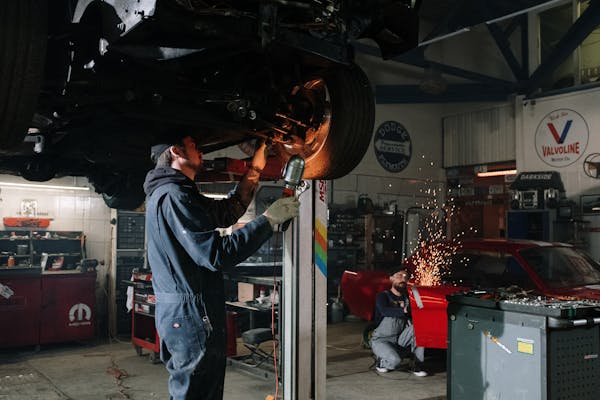A mechanic is a skilled tradesperson who uses tools to build, maintain and repair machinery, especially cars. They often work in shops and garages. Mechanics can also work in the aerospace industry and must have knowledge of the principles of statics, dynamics and materials science.
A good mechanic knows how to solve problems and keep their customers happy. They are comfortable with all kinds of vehicles and are able to explain complex issues to their customers. Check out calgary mechanics for more information.
Job description
Mechanics are skilled trade professionals who repair, maintain, and inspect machinery and vehicles. They also assemble parts and mechanical components. They must have good problem-solving skills and be able to work in a fast-paced environment. They must also have excellent manual dexterity and be willing to follow all safety precautions.
Typical mechanic job duties include repairing and maintaining engines, brakes, and other mechanical components. They may also inspect and test machines to ensure compliance with safety regulations. They may need to use a variety of tools and equipment to perform their duties. Mechanics can be found in a wide range of industries, from automotive repair shops to large manufacturing plants.
In some cases, mechanics are expected to provide customer service and explain the repairs or maintenance they are performing. They often spend long hours on their feet and must be able to lift heavy objects. They may also need to wear a face mask when working with dangerous chemicals.
Education and training requirements
Mechanics work in a variety of settings, including repair shops, factories, construction sites, aircraft hangars, and marine repair facilities. Those who have a formal education in the field are more likely to be offered higher-paying jobs than those who learn on the job. They also have a wider knowledge base and skills that can be easily transferred to different types of employers.

Moreover, they must have the ability to understand complex engine components and systems, as well as their interaction with each other. This requires a strong understanding of mathematics, computer and electronics skills, as well as mechanical dexterity.
Most states have no minimum educational requirements for mechanics, but most employers prefer to hire applicants who have post-secondary training. Some states require certification from the ASE, and some have licensing requirements for certain kinds of automotive mechanic jobs. Getting certified can boost a technician’s career options, especially since many car manufacturers have their own manufacturer-specific certification programs.
Work environment
Mechanics work in a variety of settings, including repair shops, industrial plants, and construction sites. They must be comfortable working in a non-temperature controlled environment and should be able to follow strict safety protocols when using equipment and tools. Mechanics also have to be prepared for the physical demands of their jobs, as they may spend long periods of time standing or lifting heavy objects.
Truck mechanics specialize in repairing and maintaining trucks, such as tractor units, dump trucks, and garbage trucks. They must be able to diagnose and repair mechanical, electrical, and hydraulic systems of these vehicles.
Mechanics must be able to communicate clearly and understand technical language and schematics in order to perform their jobs properly. They also need to have strong problem-solving skills and attention to detail. They often work on a full-time basis and may have to work overtime, particularly in auto repair shops. They are also required to maintain records and inventories of parts and materials.
Salary
The salary of a mechanic depends on many factors, including years of experience and education level. Generally, those with higher levels of experience earn more money. In addition, the type of job and industry can also affect a mechanic’s salary.
Mechanics can find employment in various industries, such as car dealerships and repair shops, automotive part stores, and fleet maintenance companies. Some mechanics choose to work independently and set up their own business. These professionals often need to invest in their own equipment and tools.
Mechanics are typically paid an hourly rate. They are expected to wear safety gear, such as durable coveralls, gloves, and eye protection. They may also need to use a respirator in some situations. Additionally, they need to be able to listen carefully and follow instructions.